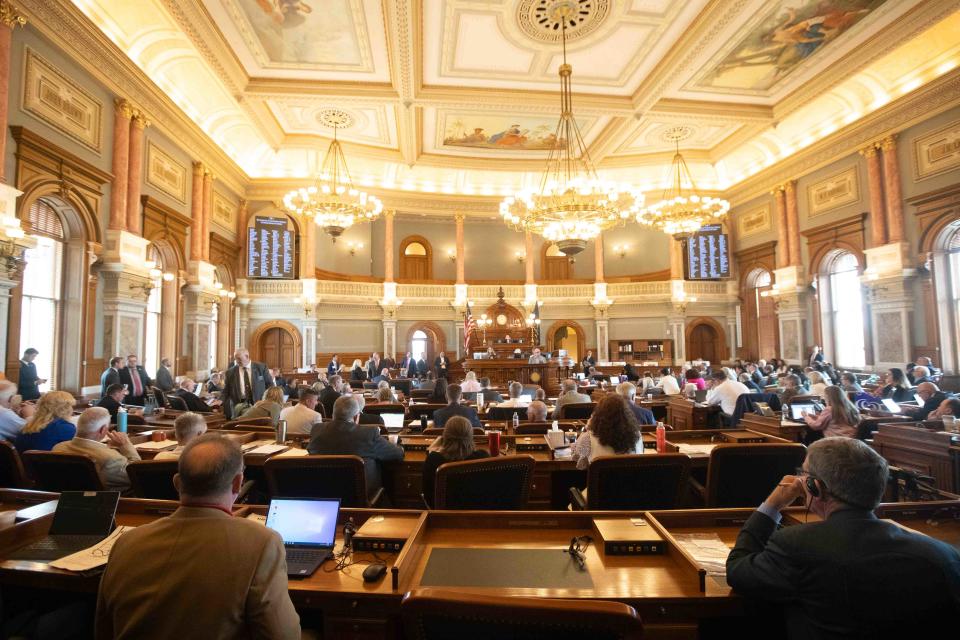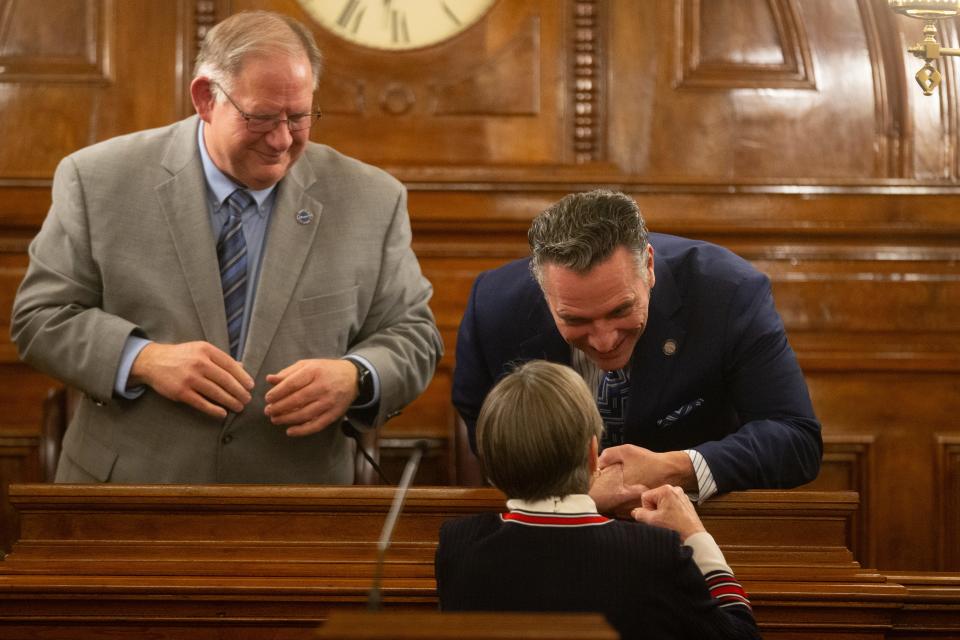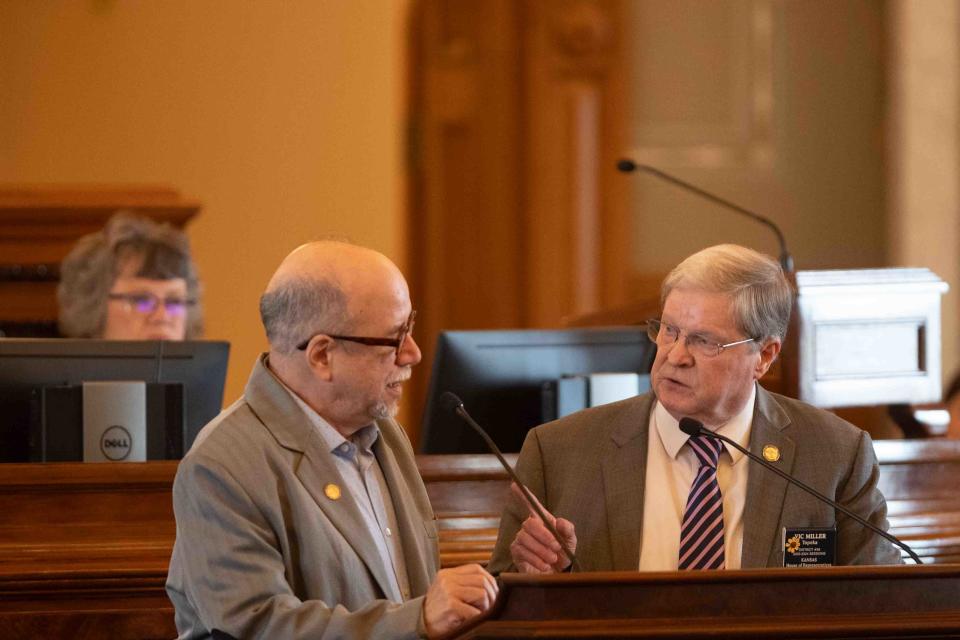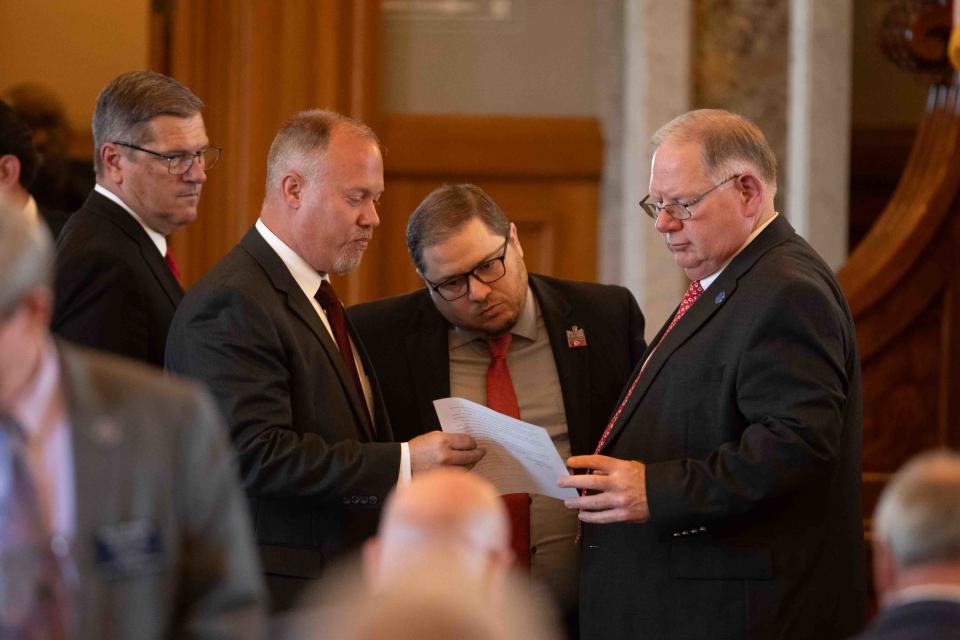Kansas lawmakers pass major compromise tax cut bill, and governor promises to sign it
- Oops!Something went wrong.Please try again later.
Kansas passed broad tax cuts in one day during special session after three attempts earlier this year didn't get enough support to override a veto.
The latest bill is a compromise between the Democratic governor and Republican legislative leadership, who negotiated the bill before the Tuesday special session. Gov. Laura Kelly committed to signing the bill, and called the special session explicitly for them to pass a tax cut.

"I appreciate the Legislature's quick work today to pass this tax relief package," Kelly said in a statement. "Although this package is not perfect and emphasizes income tax reductions instead of property tax relief, it does provide significant relief while preserving our ability to continue fully funding our public schools, roads and bridges, and State Water Plan. I will sign this bill upon receiving it."
The compromise plan passed 34-4 in the Senate and 121-2 in the House.
House Speaker Dan Hawkins, R-Wichita, and Senate President Ty Masterson, R-Andover, said the "long overdue tax relief for all Kansans" is the culmination of two years of hard work by legislators. They also wished for more tax relief than what was ultimately agreed upon.
"While it's unfortunate Governor Kelly chose to deny further relief, this is an important step in the right direction," Hawkins and Masterson said. "Rest assured, when the legislature returns in January, we will immediately get to work providing further tax relief, especially much-needed broad-based property tax reform."
Passing tax relief quickly on Tuesday left lawmakers with time to pursue a STAR Bonds proposal designed to get the Kansas City Chiefs or Royals to build a new stadium in Kansas. Lawmakers had held off on pushing the proposal until tax cuts had passed
What's in the compromise tax cut plan?
Senate Bill 1, the tax plan unveiled in the special session, is similar to Senate Bill 37 which was the last attempt at broad tax cuts during the veto session. Kelly vetoed the bill, calling it unsustainable in the long term. SB 1 tweaks some components to get it within Kelly's budgetary limits.
An overriding issue with finding a compromise was how much to cut taxes. Kelly had set her maximum at $425 million in tax cuts annually by fiscal year 2029.

While the plan in SB 1 costs $383 million by 2029, Kelly's limit also included other tax cuts enacted this year. Those bring the total impact of tax cuts approved this year to about $427 million by 2029. Over five years, the compromise plan costs a total of nearly $2 billion.
Unlike SB 37, the plan passed during special session lowers the amount of exempted property taxes from $100,000 to $75,000, does away with an expedited end to sales taxes on groceries — which is already scheduled to be fully eliminated in January — and includes a child tax care credit.
The provisions in the bill would also:
Implement a two-tiered progressive tax structure, with a 5.2% tax rate between $23,000 and $46,000, and a 5.58% tax rate on all income above 46,000.
Increase the standard deduction to $3,605 for single filers, $8,240 for joint filers and $6,180 for heads of household.
Increase personal exemptions, a tax credit that exempts income per dependent.
Eliminate state income taxes on Social Security.
Increase the child and dependent care income tax credit to 50%, up from the current 25%.
Reduce the privilege tax for banks and financial institutions to be in line with past reductions on corporate taxes.
Senate 'calls the question' to end debate
The Senate quickly moved the tax bill through the chamber less than an hour and a half into the day. Twenty-one senators voted to end the debate after Sen. Mark Steffen, R-Hutchinson, moved to strike a tax credit for day cares in favor of a child tax credit, Sen. Marci Francisco, D-Lawrence, moved to amend a section on property evaluations and Sen. Virgil Peck, R-Havana, moved to allow a county to hold an election raising sales taxes.
But Sen. Rob Olson, R-Olathe, moved to call the question, a process where legislators vote to end debate on a bill and take a final vote. Olson has been a stumbling block for tax cuts this year; he endorsed the governor's plan and provided votes against Republican leadership's preferred plans and to sustain the governor's vetoes of GOP tax plans.
This compromise plan, which the governor promised to sign if not significantly altered, was negotiated by House and Senate GOP leadership with the governor's office. But most of the provisions within it have previously been debated, and in many cases, passed through both chambers.
Those who voted no to call the question accused the majority of shutting down debate and not doing its due diligence on the bill. Sen. Tom Holland, D-Baldwin City, who drafted his own tax plan before the special session and said he intended to introduce it as an amendment, called the legislative process broken.
"If you look at the way this process has gone, your tax committee got handed a bill, they never got the opportunity to work the components, this was brought to the floor directly," Holland said. "We know the consensus is certain folks in here, they do not want to own up to their own failings of this legislative process."
But others said any amendment could put the tax cut at risk, and that some amendments are likely messaging opportunities.
"In principal, I don't like to shut down debate, in reality what we're doing now today is one of two things to continue: We're going to jeopardize the tax plan we have today and Kansans get no tax relief, or we're going to get caught on a gotcha vote for elections," said Sen. Renee Erickson, R-Wichita. "That's the only thing that can happen by continuing this discussion."
The House
Multiple House members raised concerns about this new bill's limited property tax relief.
Rep. Adam Smith, R-Weskan and the chair of the tax committee, introduced the bill and said he was disappointed property taxes took the cut but they'll try again next year.
Rep. Tom Sawyer, D-Wichita and the top House Democrat on tax policy, supported bill and also stated his opposition to removing substantial property tax cuts previously voted on in SB 37.

"I'm really disappointed the $100,000 exemption is not in here, but we will be back here in six months and I agree with the chairman, we need to make that a priority and work hard on getting some property tax relief," Sawyer said. "I think that's a key thing that's not in here. I would urge the body to support the bill here today and let's get this off the table, let's get this income tax cut, let's get Social Security exemption, let's get the child care tax cut increase, let's get all those good things, get them done. Then come back in January to fight for more property tax relief."
House Minority Leader Vic Miller, D-Topeka, moved to amend the plan by adding language on a property tax relief program for disabled veterans.
Smith said he was concerned if they amended the bill that Kelly would veto it and it would be difficult to override her veto in a special session.

"I would like to have a heart-to-heart with the governor before she signs or vetoes the bill and explain to her the choices between people making a quarter million dollars or more versus the interest of unemployed totally disabled veterans who might be losing their homes because of high property taxes," Miller said. "I have a pretty high trust that the governor can be convinced."
Miller's amendment failed.
"Tax relief is not taken lightly," Sawyer said. "There's a lot of different ways we can do it as I said, it might have been last year, we have 125 members and if we had you each develop your perfect plan, we'd probably have at least 125 different versions. It looks like this is a plan that we can get done and get signed to give some tax relief back to Kansans. So, I'd appreciate your affirmative vote."
This article originally appeared on Topeka Capital-Journal: Kansas lawmakers pass major tax cut bill that Laura Kelly will sign

